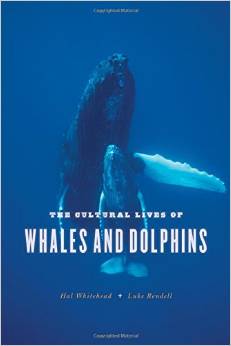 An interesting discussion has appeared in Salon.com. It’s an excerpt from The Cultural Lives of Whales and Dolphins by Whitehead and Rendell. Here’s an excerpt from the excerpt:
An interesting discussion has appeared in Salon.com. It’s an excerpt from The Cultural Lives of Whales and Dolphins by Whitehead and Rendell. Here’s an excerpt from the excerpt:
There are now, however, enough solidly demonstrated examples . . . for the study of social learning to be accepted as a valid and growing field within mainstream animal behavior science. . . While behavioral ecologists may question the evidence and suggest alternative explanations, they are generally not appalled by the very notion of chimpanzee or whale culture.
The fiercest critics come mostly from anthropology and psychology. Here, it is the very concept of animal culture that is anathema, not the nature of the evidence. It is part of the paradigm in most of the social sciences, insofar as the social sciences have paradigms, that humans are unique in having culture or, at least, in being overwhelmingly cultured. Culture in other species, if it exists, is an epiphenomenon, not terribly important. It is the challenge to this paradigm that is being resisted.
And finally
We have got ourselves an idea of what we mean by “culture.” We have seen how controversial the notion that nonhumans might have culture is in some quarters. We have also seen how quickly things are changing in the way we understand these issues.
We have a way to go before we have a good methodology for identifying the importance of culture to wild animals, but over the past decade the picture has changed in favor of nonhumans of some species possessing culture.
Without the information they learn from each other, their behavior would be very different. We hope that scholars with as much insight as Robert Boyd and Joe Henrich would not write today, “Unlike other animal species, much of the variation among human groups is cultural,” as they did in 1998.
And it’s on Kindle, dammit, so I’ll probably end up adding it to my pile of yet more things to read.
If you enjoyed this post, please consider donating to Vridar. Thanks!

Jane Goodall was criticized long ago for violating a principle held by her fellow ethologists that a scientist should not engage in anthropomorphism by giving names to animals (such as “David Graybeard”) and assigning to them human-like attributes. Ignoring this warning, she was the first to discover (so far as I know) that chimpanzees used tools, such as sticks to “fish” for termites, and leaves to use as toilet paper–thus destroying the previously-cherished notion that tool-making was uniquely the function of humans. Other studies have since been done demonstrating that the mental capacities of animals (e.g., elephants) were hitherto hidden from human understanding by the biased nature of the testing. When the bias gave way, forth came the knowledge. There are myriad forms of intelligence, such as the hive intelligence of bees. The uniqueness of humankind lies in its imagination, which has given it the power to crowd out other species and pollute the planet to the extent that we are now looking at a likely mass extinction within a relatively near future.
I feel fully qualified to execise “Mammaliamorphism”.
( θηλαστικόμορφισμός ? Thilastikómorphism? when ‘mammal’ like ‘anthropo’ should be Greek.